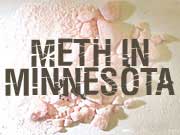Meth in Minnesota
June 14, 2004
 |
| A comparison of meth lab seizures in Midwestern states shows that while the problem in Minnesota is increasing, other states are affected more seriously. The information comes from the Drug Enforcement Administration. (MPR Graphic/Ben Tesch) |
St. Paul, Minn. — Law enforcement officials say methampethamine is now the drug of choice in rural Minnesota because it's easy to get and easy to make. Twenty percent of meth used in Minnesota is being made in Minnesota in clandestine meth labs -- mostly in rural areas with few people.
But rural meth labs are not the heart of the Minnesota meth supply. The Twin Cities is. Eighty percent of our meth comes from out of state, smuggled in delivery trucks and hollowed-out car bumpers, usually from Mexico and southwest states. After changing hands in the metro area, much of it leaves again, for the suburbs, Indian reservations, and small towns.
The recipe for meth is fairly simple. Its main ingredient is cold medication, which is crushed into a powder and mixed with a variety of acids or solvents. The recipe includes chemicals like brake fluid, drain cleaner, phosphorous from matches, alkaline batteries, and anhydrous ammonia.
It's a toxic mix that delivers a high that can last for days. It also disintegrates people's teeth and permanently damages the central nervous system. Users often become paranoid, aggressive and violent.
Meth creates unintended victims as well, in the children of those who use and make the stuff. Children who are exposed to the caustic chemicals can suffer health effects of their own. More important, their meth-using parents become so focused on the drug that they neglect the kids. Foster care placement of children who have drug-addicted parents has seen a dramatic increase over the past three years.
Institutions such as schools and law enforcment are also affected. Some Minnesota high school students say it's easier to get meth than alcohol. A new study by the Hazelden Foundation has found that meth use among teens in the Twin Cities area is rising. Law enforcement officicals are trained to deal with drugs and drug users, but meth presents new challenges to them. Meth users are aggressive and can turn violent. The caustic chemicals used to make meth create a health hazard.
The effects of methamphetamine use are working their way through our criminal justice system. The rapid rise in meth arrests is one of the main factors in sharply higher prison populations. The cost of housing drug offenders has renewed an old debate -- what works best, prison or treatment?
Addiction to meth is thought to be more difficult to overcome than for other substances. Drug counselors say treatment techniques, and the health care industry, need to respond to those differences.
|
News Headlines
|
Related Subjects
|

